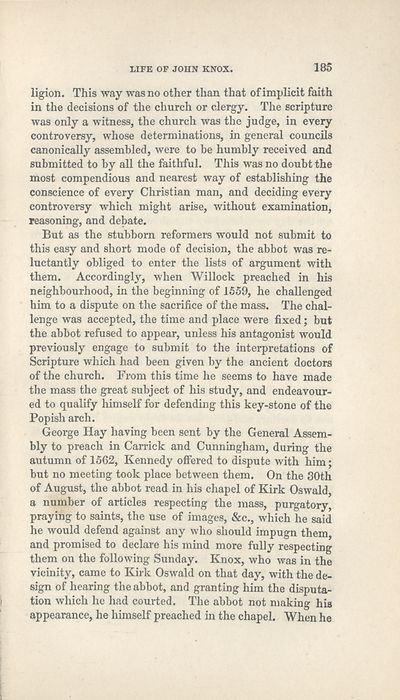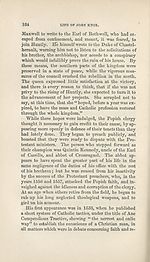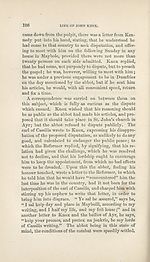Download files
Complete book:
Individual page:
Thumbnail gallery: Grid view | List view

LIFE OF JOHN KNOX.
185
ligion. This way was no other than that of implicit faith
in the decisions of the church or clergy. The scripture
was only a witness, the church was the judge, in every
controversy, whose determinations, in general councils
canonically assembled, were to be humbly received and
submitted to by all the faithful. This was no doubt the
most compendious and nearest way of establishing the
conscience of every Christian man, and deciding every
controversy which might arise, without examination,
reasoning, and debate.
But as the stubborn reformers would not submit to
this easy and short mode of decision, the abbot was re¬
luctantly obliged to enter the lists of argument with
them. Accordingly, when Willock preached in his
neighbourhood, in the beginning of 1559, he challenged
him to a dispute on the sacrifice of the mass. The chal¬
lenge was accepted, the time and place were fixed; but
the abbot refused to appear, unless his antagonist would
previously engage to submit to the interpretations of
Scripture which had been given by the ancient doctors
of the church. From this time he seems to have made
the mass the great subject of his study, and endeavour¬
ed to qualify himself for defending this key-stone of the
Popish arch.
George Hay having been sent by the General Assem¬
bly to preach in Garrick and Cunningham, during the
autumn of 1562, Kennedy offered to dispute with him;
but no meeting took place between them. On the 30th
of August, the abbot read in his chapel of Kirk Oswald,
a number of articles respecting the mass, purgatory,
praying to saints, the use of images, &c., which he said
he would defend against any who should impugn them,
and promised to declare his mind more fully respecting
them on the following Sunday. Knox, who was in the
vicinity, came to Kirk Oswald on that day, with the de¬
sign of hearing the abbot, and granting him the disputa¬
tion which he had courted. The abbot not making his
appearance, he himself preached in the chapel. When he
185
ligion. This way was no other than that of implicit faith
in the decisions of the church or clergy. The scripture
was only a witness, the church was the judge, in every
controversy, whose determinations, in general councils
canonically assembled, were to be humbly received and
submitted to by all the faithful. This was no doubt the
most compendious and nearest way of establishing the
conscience of every Christian man, and deciding every
controversy which might arise, without examination,
reasoning, and debate.
But as the stubborn reformers would not submit to
this easy and short mode of decision, the abbot was re¬
luctantly obliged to enter the lists of argument with
them. Accordingly, when Willock preached in his
neighbourhood, in the beginning of 1559, he challenged
him to a dispute on the sacrifice of the mass. The chal¬
lenge was accepted, the time and place were fixed; but
the abbot refused to appear, unless his antagonist would
previously engage to submit to the interpretations of
Scripture which had been given by the ancient doctors
of the church. From this time he seems to have made
the mass the great subject of his study, and endeavour¬
ed to qualify himself for defending this key-stone of the
Popish arch.
George Hay having been sent by the General Assem¬
bly to preach in Garrick and Cunningham, during the
autumn of 1562, Kennedy offered to dispute with him;
but no meeting took place between them. On the 30th
of August, the abbot read in his chapel of Kirk Oswald,
a number of articles respecting the mass, purgatory,
praying to saints, the use of images, &c., which he said
he would defend against any who should impugn them,
and promised to declare his mind more fully respecting
them on the following Sunday. Knox, who was in the
vicinity, came to Kirk Oswald on that day, with the de¬
sign of hearing the abbot, and granting him the disputa¬
tion which he had courted. The abbot not making his
appearance, he himself preached in the chapel. When he
Set display mode to:
![]() Universal Viewer |
Universal Viewer | ![]() Mirador |
Large image | Transcription
Mirador |
Large image | Transcription
| Antiquarian books of Scotland > Scotland/Scots > Life of John Knox ; and, The life of Alexander Henderson > (203) |
|---|
| Permanent URL | https://digital.nls.uk/131834740 |
|---|
| Description | Thousands of printed books from the Antiquarian Books of Scotland collection which dates from 1641 to the 1980s. The collection consists of 14,800 books which were published in Scotland or have a Scottish connection, e.g. through the author, printer or owner. Subjects covered include sport, education, diseases, adventure, occupations, Jacobites, politics and religion. Among the 29 languages represented are English, Gaelic, Italian, French, Russian and Swedish. |
|---|

